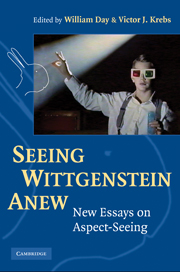Book contents
- Frontmatter
- Contents
- List of Contributors
- Acknowledgments
- Abbreviations of Wittgenstein's Works
- Seeing Wittgenstein Anew
- Introduction: Seeing Aspects in Wittgenstein
- I ASPECTS OF “SEEING-AS”
- II ASPECTS AND THE SELF
- II.1 Self-Knowledge
- 5 In a New Light
- 6 The Bodily Root
- II.2 Problems of Mind
- III ASPECTS AND LANGUAGE
- IV ASPECTS AND METHOD
- Appendix: A Page Concordance for Unnumbered Remarks in Philosophical Investigations
- List of Works Cited
- Index
5 - In a New Light
Wittgenstein, Aspect-Perception, and Retrospective Change in Self-Understanding
Published online by Cambridge University Press: 05 June 2012
- Frontmatter
- Contents
- List of Contributors
- Acknowledgments
- Abbreviations of Wittgenstein's Works
- Seeing Wittgenstein Anew
- Introduction: Seeing Aspects in Wittgenstein
- I ASPECTS OF “SEEING-AS”
- II ASPECTS AND THE SELF
- II.1 Self-Knowledge
- 5 In a New Light
- 6 The Bodily Root
- II.2 Problems of Mind
- III ASPECTS AND LANGUAGE
- IV ASPECTS AND METHOD
- Appendix: A Page Concordance for Unnumbered Remarks in Philosophical Investigations
- List of Works Cited
- Index
Summary
In 1957 Iris Murdoch wrote, with perhaps too much concision, “Man is a creature who makes pictures of himself, and then comes to resemble the picture.” And in an earlier diary entry from June 14, 1952, she had written: “There is a lot which I don't put into the diary, because it would be too discreditable – and maybe even more painful.” Characteristically, she quickly turns to reflect upon, to refine, and to qualify what she has just written, adding parenthetically, “At least – no major item omitted but certain angles altered – and painful incidents omitted.” Still earlier, shortly after having listened to a lecture entitled “The Past” by Elizabeth Anscombe in October 1947, Murdoch, as her biographer Peter Conradi reports, was reflecting on “what she might feel if presented with documentary evidence – for example, journals – about her forgotten past.” She then writes a passage that both gives voice to a kind of guarded skepticism concerning self-knowledge and makes a strong claim concerning the active nature of our involvement with our past. She writes: “Suppose I were given evidence about what I thought at the time. My diaries, etc. I think I would not accept that evidence. I'd still feel I didn't know what my past really was.” Describing these diary pages – pages within a diary attempting to advance our understanding of the degree to which a diary is itself credible, authoritative, and revelatory – Conradi says, “Over many pages of reflection, she reaches towards a distinction between a ‘frozen’ and an ‘unfrozen’ past. So long as one lives, one's relationship with the past should keep shifting.”
- Type
- Chapter
- Information
- Seeing Wittgenstein Anew , pp. 101 - 119Publisher: Cambridge University PressPrint publication year: 2010
- 1
- Cited by

